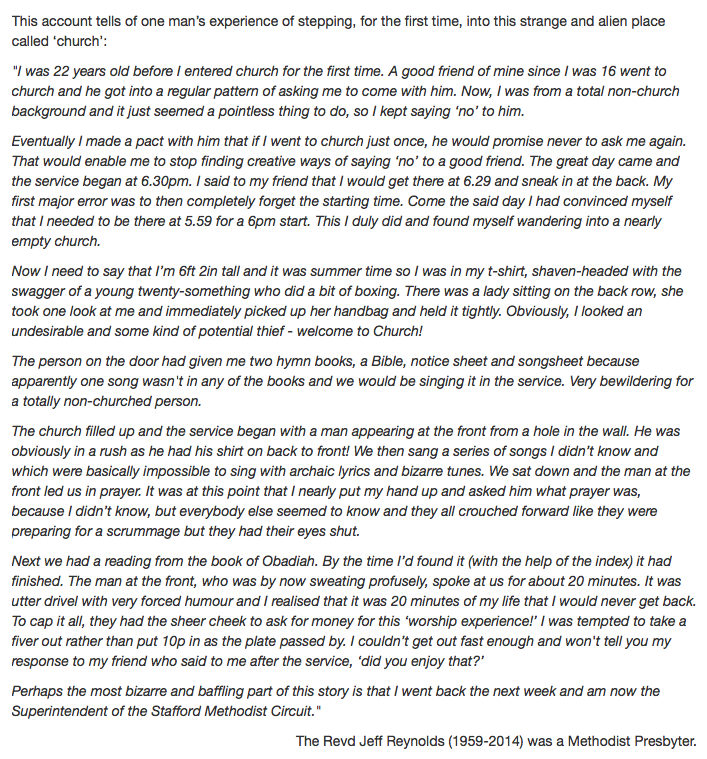|
I'm going to have a rant... You've been warned. "This just makes me angry. WHY did they need to include the last paragraph!? All it does is justify the church being a crap, unwelcoming and baffling place for the world, rather than encouraging significant change and positive contextualisation, on the basis that if God wants to convert them, he'll do it without us having to make an effort to be a people and place that outsiders want to be part of! Surely it would be more helpful as an account without the closing paragraph?" That's the message I sent to my boss once I'd read the text in the screenshot at the bottom of the page. It was a gut reaction, and maybe with time I'll get over it, but sometimes the gut is right, right? I should probably give some context. I am nearing the halfway point in the material (though not the work) of the course to become a local preacher in the Methodist Church. The module I'm currently making my way through is about "Encountering God: in Unexpected Places." And I'm all for it. I could chat with you for years about liminal spaces, about the places where heaven and earth intersect, about the stones, the cinema and popular culture screaming of who God is, especially when Christians aren't. I love playing "Hide and Seek" with God in the every day. I'm also excited at the prospect of God perhaps showing up in churches (radical, I know). I'm eager for people to meet Him in word and worship, in a place full of broken people with a passion for encounter. And I dare say, that one of the most unexpected places to find God might be in the sort of church experience described so vividly below, But what I started reading as a prophetic warning of what happens when our churches become "churchy" somehow managed to finish as a fairy-tale, with a closing 9 words negates the warning and encouragement to change with a "God-works-in-mysterious-ways" vibe. I have no doubt in the value of the testimony in the example, of the power of God to work "in spite of" the experience, but for the one who returned and went on, there must be many, many more who don't come back. The pre-amble to the example below had great promise: "Do you have any experience of going to a church from another tradition, with which you are not familiar? Or perhaps attending worship from another faith? What can you remember of that experience? Were there things which seemed odd to you, but normal to everyone else there? What do you think it might feel like to be a newcomer in your place of worship?" And that's what I want to take away. I don't want to rely on the "mysterious ways of God," which are mysterious enough without us placing stumbling blocks in the way of people meeting with him. I'd rather we changed our churches to be places of safety, belonging, acceptance, and familiarity rather than our disenfranchising "Holy-Huddles" only for members who speak the right words and know when to stand and sit and where to find Obadiah in the Bible.* If you've read this far, and go on to read the snippet below, try re-reading it without the closing paragraph, and see whether what's described is a church you'd want to be part of, that you'd invite people too, that you'd feel comfortable trying as an "outsider." Let's make an effort for people to want to be part of our community, rather than using this valid testimony as a reason to stay the same. Rant Over *I'm convinced that in most churches the majority of the "regulars" wouldn't know that the book of Obadiah existed, let alone where to find it. So if you're not familiar with church, and ever darken the doors, don't be fooled by the people fumbling in their Bibles** and pretending to read.
**That's if people even bother with Bibles... But that's a different rant. |
MARCRemarcable is one man blogging about Youth Work, Theology, Family, Life and those other random things that come to mind. Archives
February 2023
Categories
All
|

 RSS Feed
RSS Feed